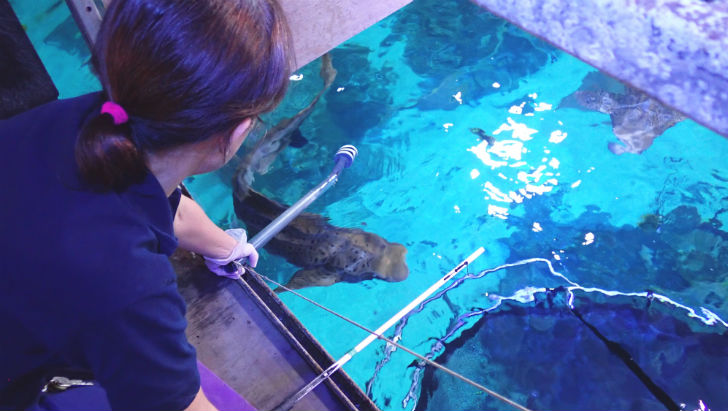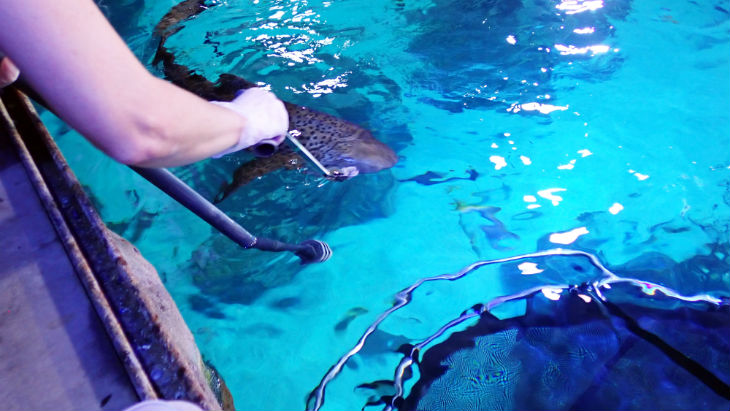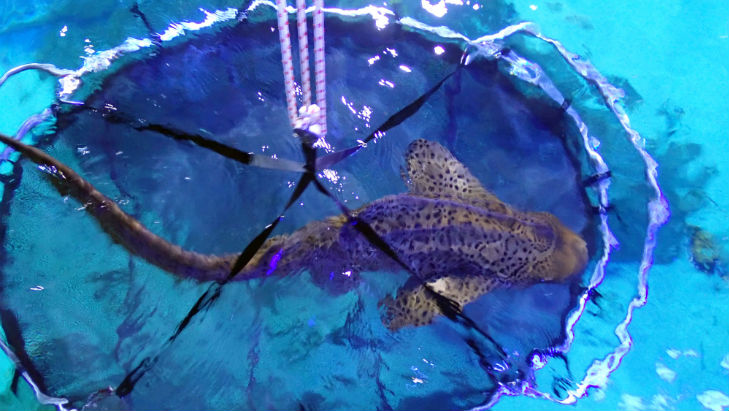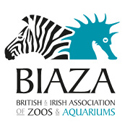Here at the National Marine Aquarium, we have some amazing staff across all teams, including our world-class husbandry team. One member of this team is Heather Williams, who does amazing work with the conditioning of some of our larger animals. We had a chat with Heather to find out more about this and Aquarium animal husbandry as a whole.
What is your name and role at the National Marine Aquarium?
My name is Heather Williams and I am a Biologist/Diver at the National Marine Aquarium.
Tell us about your journey leading up to your work as a Biologist
I grew up in Teesside in the north east. As I always knew I wanted to work with the sea or sea creatures, I learnt to SCUBA dive as soon as BSAC would let me at 14. At 18, I moved to Plymouth for my degree in Ocean Science with Marine Biology and volunteered at the Aquarium from my second year onwards including studying seahorses for a university honours project. Back then, I found out if you hang around the aquarium long enough they feel sorry for you and will employ you ????. Things have changed though these days as we are working with a much wider range of livestock and larger number of exhibits with specific demands for successful care. I was lucky enough to land a job within the husbandry team a few months after graduating from university. After a couple of years I wanted to see a bit more of the world, so spent a few years working abroad in other aquariums in the Cayman Islands and Ireland before coming back to my adopted home of Plymouth and the NMA again.
What’s the best thing about your job?
The best thing about my job are the animals, my four year old son is becoming very knowledgeable about the sea and its inhabitants too (you could call it brainwashing…????) and has been known to correct visitors who are confused about the animals they are looking at – he’s heading to be the youngest aquarium staff member we have ever had!

Heather leading Zeus the zebra shark using a black and white target during feeding time
What is your role within the BIAZA committee?
I am an aquarium liaison officer within the BIAZA (British and Irish Association of Zoos and Aquariums) Animal Welfare and Training Working Group. This group was set up by Jim Mackie who is the animal training and behaviour officer at ZSL London Zoo, with a view to educate zoo keepers and aquarists about best practices in training, and also how best to improve animal welfare both through exhibit design and enrichment (e.g. by providing novel items or smells for animals to investigate).

Successful following of the target means a tasty squid reward
Talk us through how you can teach elasmobranchs (sharks and rays) to respond to a target
The best way to train an animal is through positive reinforcement, and always moving in small steps. A shark can be trained to follow a target, firstly they need to overcome their wariness of the target (desensitised) by placing it in the tank during feeding time. Then, gradually, the shark can be fed closer and closer to the target until they are fed right in front of it. Once they are used to this, the target can go in the tank first and the shark fed when it approaches the target. This can be extended to the point where the shark will follow the target and pause in front of it for a time before being rewarded with food. Animals can then be taught to swim into nets which can make moving them, and carrying out health checks and procedures, much easier and less stressful both for the animal and staff.

Zebra sharks can even be conditioned to calmly swim into a net, which significantly reduces stress levels of the shark.
Finally, do you have any advice for those interested in pursuing marine biology?
Anyone interested in marine biology can get involved in various citizen science projects. For example The Great British Egg Case Hunt, organised by the Shark Trust is used to research elasmobranch (shark and ray) distribution around the UK. Get involved in beach cleans in your local area – Plymouth Beach Clean Volunteers are very active in the local area, you can find this group on Facebook. There are various books out there that can help identify rock pool creatures that may be found at low tide too! Those who may want to pursue marine biology as a career would do well to focus on the sciences at school and look for a related degree – Plymouth University is an excellent place to study!













